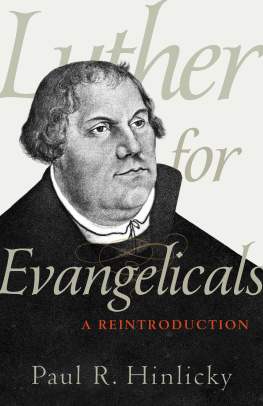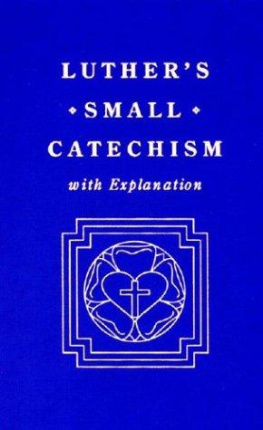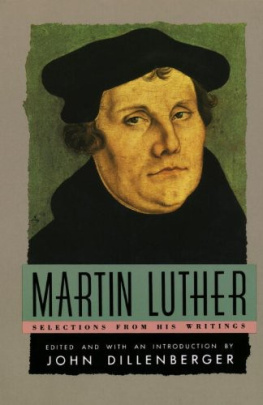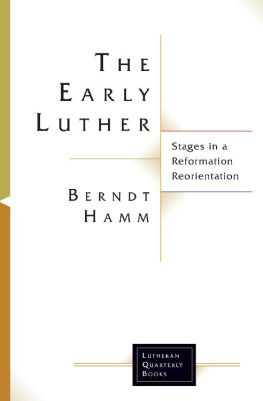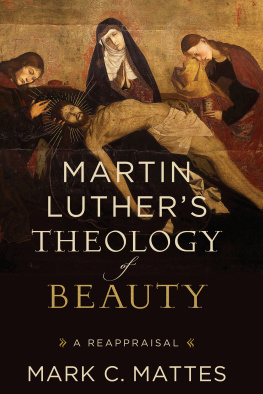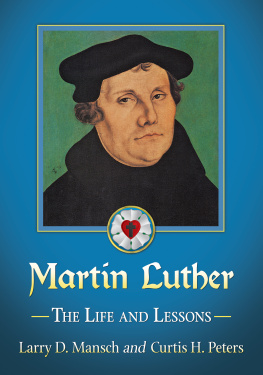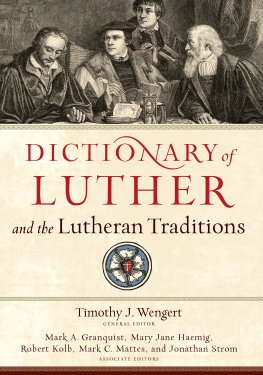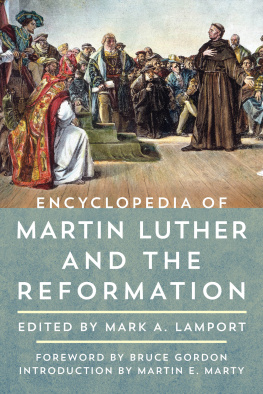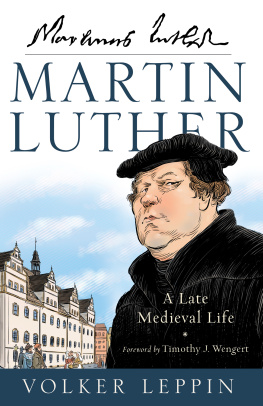A History of Luther Seminary -- A History of Luther Seminary
1
Praise for A History of Luther Seminary
This is an institutional history about challenges. Mark Granquist clearly and accessibly sorts through the theological challengesregarding the Augsburg Confession, predestination, low and high church worship practiceand shifting institutional relationships that shaped the origin and early development of Luther Seminary. He then moves on to the social and financial challenges that have impacted it since the 1960s. Avoiding nostalgia and boosterism, he presents a picture of midwestern Lutheran diversity that many will find surprising, and some, uncomfortable. Written at a time when seminary education generally and Luther Seminary specifically are facing perhaps their greatest challenges ever due to declining enrollments, this book will be of great value to not only alumni interested in the history of Lutheranism but also anyone concerned with the question of how mainline Protestant seminary education will survive in the upcoming decades.
Jeanne Halgren Kilde, director of religious studies program, University of Minnesota
The history of Luther Seminary is not only long, it is also the story of multiple institutions each with its own characters, setting, and distinctive concerns. Granquist conducts his readers through the twists and turns of these intertwining stories with clarity. He highlights each schools relationship with its larger ecclesiastical (and often ethnic) community. At the same time, he points to the similarities of purpose and practice that allowed these schools to undertake the challenging process of combining their work. This complex story also illumines the ways in which the churches associated with these schools adapted to their ever-changing cultural context.
L.DeAne Lagerquist, Harold H. Ditmanson Professor of Religion, St. Olaf College
This book does an admirable job of consistently integrating the history of Luther Seminary into the larger story of developments in the Lutheran community. Though these interactions are often complex, Granquists account is readable, clear, and interesting. Readers come to see the remarkable changes experienced by the seminary during the last century and a half.
Darrell Jodock, professor emeritus, Gustavus Adolphus College
A History of Luther Seminary: 18692019 is much more than the history of particular theological seminary. In this telling of Luther Seminarys story, Mark Granquist offers a primer on Lutheran theological education in America from the time of the first Lutheran immigrants to the New World, and he ushers readers into a centuries-long conversation concerning what ministers of the gospel need from their academic and pastoral formation. Anyone interested in how todays church prepares its leaders will be engaged by this story and inspired to continue that conversation.
Mary Hinkle Shore, rector and dean, Lutheran Theological Southern Seminary, Lenoir-Rhyne University
Luther Seminary traces its roots back to the mid-nineteenth century and Norwegian immigrants who sought a new life in the fertile soil of the Midwest. Lutheranism, whether churchly or pietist, is above all a theological movement in the church that demands an educated clergy with seminary training. In this regard, theological conflict is inevitable, part and parcel of Lutheran identity, with seminaries serving as the chief battleground. Predestination verses conversion, legalism verses antinomianism, congregationalism verses clericalism, liturgical formalism verses free expression in worship, and, most important of all, the evangelical impulse verses cultural accommodationthese are the battles. Luther Seminary has seen them all, its faculty often at the center of the fray. With sympathy, fairness, and candor, Mark Granquist tells the story of Luther Seminary as it has played itself out. His book is admirable and trustworthy.
Walter C. Sundberg Jr., professor emeritus, Luther Seminary
Mark Granquists history of Luther Seminary places the story of this vital school in the midst of the challenges of the world. Faculty and alums developed the capacity to turn in new directions as times and the church required. Granquist helps us see in a compelling way the intimate and dynamic relationship between a seminary and the congregations it serves as they together seek to be relevant for the dramatic challenges facing the churches today.
Maria E. Erling, United Lutheran Seminary
In the hands of distinguished historian Mark Granquist, this history of the ELCAs largest seminary is much more than the story of one institution. Luther Seminary is a microcosm of American Lutheranisms remarkable odyssey from ethnic insularity to mainline establishment. It wasnt always a smooth journey. Granquist tells it straight, recounting bygone battles (when Norwegian-speaking professors fought over the fine points of predestination) and recent ones (when sexuality, ecumenism, and budgets were the flash points). Through it all emerges a picture of a seminary that remains adaptable and strongan enduring witness to Christian truth in a secular age.
Peter J. Thuesen, Indiana University-Purdue University Indianapolis
A History of Luther Seminary
18692019
Mark Granquist
Fortress Press
Minneapolis
A HISTORY OF LUTHER SEMINARY
18692019
Print ISBN: 978-1-5064-5662-1
eBook ISBN: 978-1-5064-5663-8
Copyright 2019 Fortress Press, an imprint of 1517 Media. All rights reserved. Except for brief quotations in critical articles or reviews, no part of this book may be reproduced in any manner without prior written permission from the publisher. Email copyright@1517.media or write to Permissions, Fortress Press, PO Box 1209, Minneapolis, MN 55440-1209.
Scripture quotations are from the New Revised Standard Version Bible 1989 Division of Christian Education of the National Council of the Churches of Christ in the United States of America. Used by permission.
Cover design: Laurie Ingram
Cover images: Top row, left to right: Dedication of United Church Seminary (1902), building named Bockman Hall in the 1950s (photo by Server P. Eggan, courtesy of the Luther Seminary Archives); Crucifixion by Paul Granlund (1967), Chapel of the Cross (photo by Beth Ann Gaede, 2018); Bockman and Gullixson Halls (courtesy of the Luther Seminary Archives). Bottom row, left to right: Celtic cross in front of Bockman Hall (courtesy of Luther Seminary); Seminary group in front of vacant hotel (Robbinsdale, Minnesota) where Luther Seminary was located 18951899 (courtesy of the Luther Seminary Archives); cross atop Olson Campus Center (courtesy of Luther Seminary).
This book is dedicated to Lloyd and Annelotte Svendsbye and their family for their support of the study of the history of Christianity at Luther Seminary. It is further dedicated to those numerous men and women who have sacrificially given of themselves to further the work of Luther Seminary and its mission of educating leaders for Christian communities.
Contents
On the surface, the need for this book is fairly obvious. Luther Seminary has been around now, in one iteration or another, for 150 years, and as a major Lutheran and Protestant seminary in the United States, it is worth an updated history at this point. The fact that a narrative history of the seminary has not yet been written is itself another impetus for proceeding, as is the point that its history is an interesting story in and of itself and should be told. But these are rather pedestrian reasons to write a book such as this. Rather, the history of Luther Seminary is an integral part of the broader story of American Lutheranism and an important part of American religious history, especially the development of Protestant theological education within this larger narrative. So this book will not only tell the story of Luther Seminary and its people but also place its history within the context of these larger movements.



